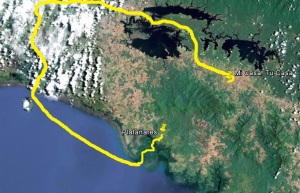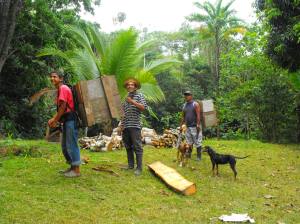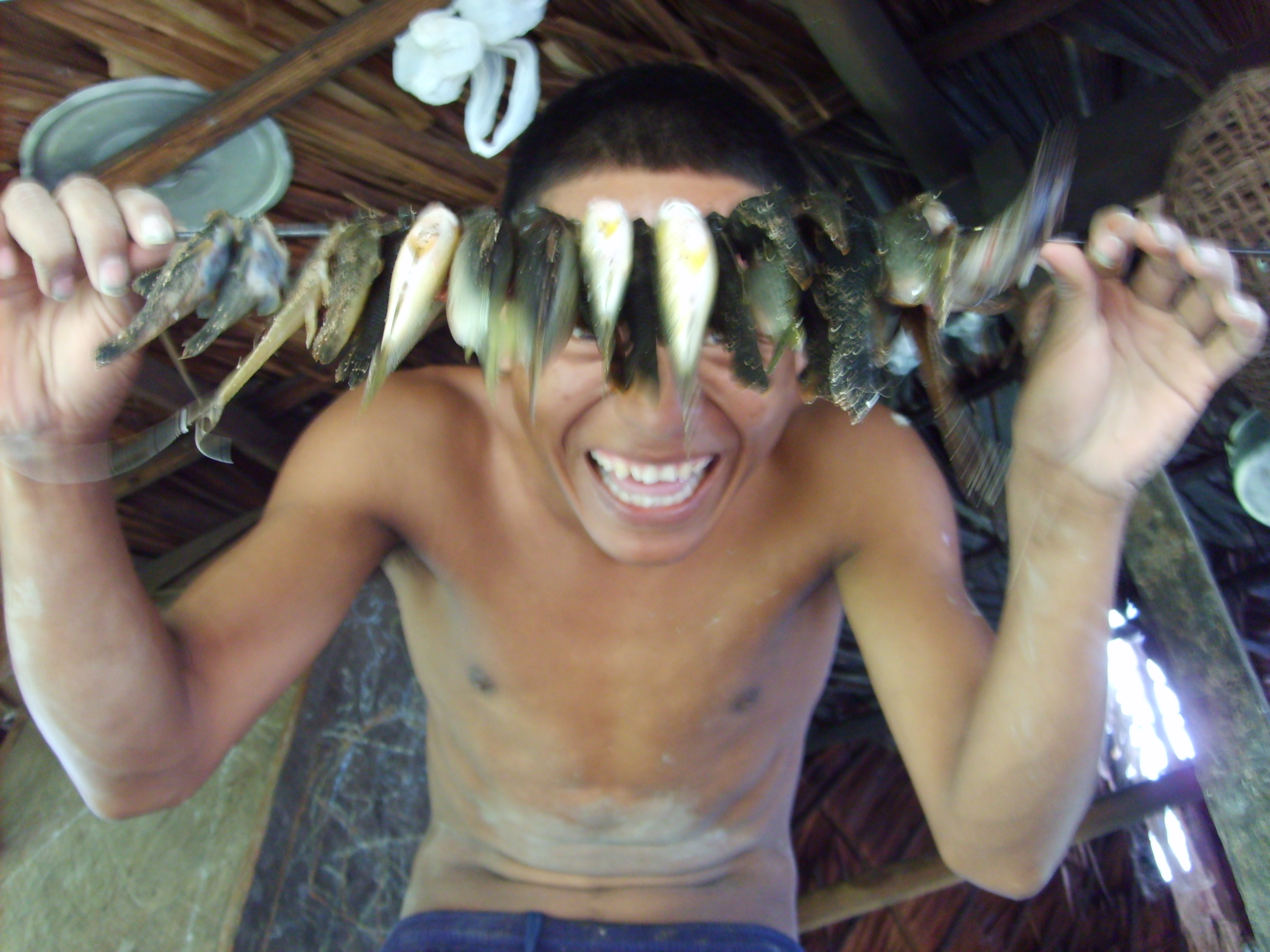Field work with our many recent visitors has taken precedence recently over the very important job of communicating to you, so we´re grateful for this opportunity to exhale an indebted thank you and recap some of what has been happening this month.

Daniel, Chris, and Nick storm Piriatí with another first, banjo music!
Previously, we received a mission trip from 3 gentlemen with BarnabasX, Daniel, Chris, and Nick. They fired an arsenal of support on us including encouragement, music, humor, sweat equity, and financial help while providing invaluable feedback about how we can maximize groups´ visits in the future. They also served as a liaison for donors, including Mount Tabor Baptist Church, to our community´s potable water system project. We´ve got the materials on site and are scheduled to start digging on Monday (tomorrow!).

as far as the truck can go... and then?
I also suspect that some from this group are guilty of fervent prayer, because what started as an effort to provide water for 15 families is morphing into a project with government financial support to ultimately benefit 124 families. We have only verbal commitments at this point, so please keep it in your thoughts. You can read more details about the BarnabasX trip and watch footage of our neighbor getting baptized in the river on their website here.

Grandpa´s first trumpet lesson.
The day after Barnabas left we picked up my cousin, Hunter, who is 16 years old with a big heart for missions. He was a great asset around our home and community whether doing carpentry projects, working on the road, or just fellowshipping with the local youth. I have to say that the most emotional event of his trip for me was when we went to a worship service in my old Peace Corps stomping grounds, Piriatí.

I´ll trade my back for 2 doses of spirit! Hunter and Jorge mix concrete for Jorge´s dad, Justo, who smooths out the upper pad of their new composting latrine.
We were armed with ukulele and trumpet, the latter of which no one around here has ever seen. I suggested we leave the instruments in the car to avoid distraction, knowing that, typically, the pastor invites us to share “special music.” But this day, no such invitation came as the service proceeded. Wondering if the Lord had other plans, I stepped onto shaky ground and asked for a sign… The next song? “My Soul Will Soar When the Trumpet Sounds.” We followed, and it was good.

Now we´ll be able to get out of our driveway in the rainy season. Thanks Hunter!
A couple days before Hunter´s departure, which involved two dead car batteries, angry dogs, and a rut march/bull run at 3:30am…(it merits a story of its own entitled “Escape from Panama”), we received Jaime, director of projects with Mennonite Brethren Mission and Trevor and Joan, veterans from the Colombian mission field that now work in Mexico. Jaime came because of a 2.5 year water/latrine/health project they approved which I mentioned in a previous letter, and Trevor and Joan came, best as I can tell, to overflow with love and encouragement.
As we sat in conference with the national assembly of leaders from the Wounaán church, Jaime told this story from his personal experience having worked for a well-known Christian organization doing projects in the developing world. Summarized:
“We went to this remote village in Africa and determined that they needed access to water. The women were walking at least an hour, one-way, to fetch water each day. We installed a well and pump and trained community members in its operation. Six months later we returned and, to our dismay, found the well and pump destroyed. Who would do such a thing? A rival tribe? Local druglords? Maybe vagrant children? No… the women of the village had destroyed the well and pump! You see, that walk to fetch water was their only respite from the monotony of work at home… their only time to be together and free from never-ending responsibility.”
This story was nothing new to us. We´d heard the same personal experience from another social worker in Africa doing well work. Another example of good intentions is not good enough. And it goes to show that this phenomenon is more commonplace than we´d like to think… not just with wells in Africa, but with all development type work all the world over. What´s the solution? Obviously, know your community, which is best accomplished by living there. Analysis and questionnaires are great, but they´re no substitute.
![466px-Yin_yang.svg[1]](https://www.faithandfruit.comwp-content/uploads/2011/07/466px-yin_yang-svg11.png?w=300)
We at faith and fruit have essentially zero knowledge of Chinese philosophy but assume that they have much to contribute.
Later, talking in private, Jaime told me that we we´re the yang to his ying. He has advanced degrees in theology and international development, and it is his job to channel the generosity of the developed world to sustainable projects in the developing world… sustainable often being termed “capacity building,” ie, in our case, when the gringos are gone, the projects grow rather than wither. He went on to say that, often, well-meaning but unqualified pastors are trying to juggle development projects outside of their expertise… or folks like Jaime are trying to work directly with local people with little help to bridge the gap in language, culture, etc. In a similar experience, this same Wounaán church received a well-meaning group of men to help build a pastor´s home. It was easy for me to empathize with the local coordinator as he expressed his frustration about trying to keep the gringos busy in building the block home, none of which were masons.
I say all this because Jaime´s comment was very affirming for us. And I hope it will encourage anyone feeling called to work in a foreign land, be you a theologian or a plumber. I think we can all find common ground in the old adage “Give a man a fish, feed him for a day, Teach a man to fish, feed him for a lifetime.” While most of us can manage to get a worm on the hook, there´s no substitute for a lesson from a good, experienced fisherman. Although our endless journey as learners will continue, we hope that the Lord uses us to pass some of it along.

Kalea with Angelica in Kuna Yala
Blessings,
alan







![466px-Yin_yang.svg[1]](https://www.faithandfruit.comwp-content/uploads/2011/07/466px-yin_yang-svg11.png?w=300)



